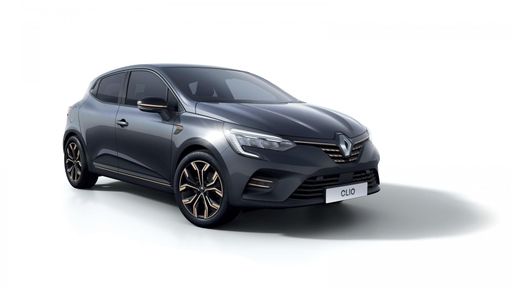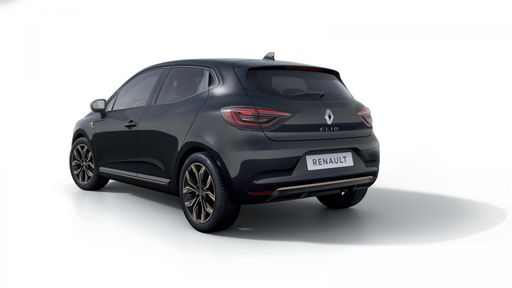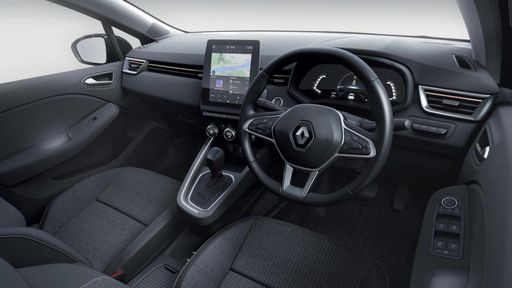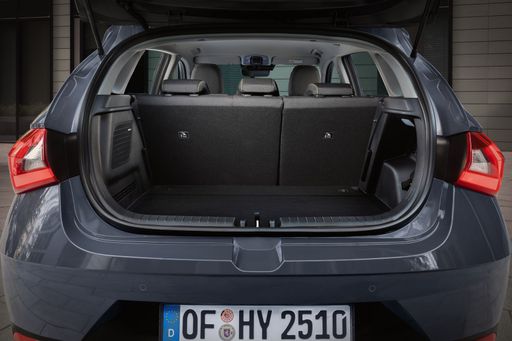Renault Clio vs Hyundai i20 – Differences & prices compared
Compare performance, boot space, consumption and price in one view.
Find out now: which car is the better choice for you – Renault Clio or Hyundai i20?
The Renault Clio (Hatchback) comes with a Full Hybrid or Petrol engine and Automatic or Manuel transmission. In comparison, the Hyundai i20 (Hatchback) features a Petrol MHEV or Petrol engine with Automatic or Manuel transmission.
When it comes to boot capacity, the Renault Clio offers 391 L, while the Hyundai i20 provides 352 L – depending on how much space you need. If you’re looking for more power, decide whether the 143 HP of the Renault Clio or the 100 HP of the Hyundai i20 suits your needs better.
In terms of consumption, the values are 4.30 L per 100 km for the Renault Clio, and 5.20 L for the Hyundai i20.
Price-wise, the Renault Clio starts at 16600 £, while the Hyundai i20 is available from 17400 £. Compare all the details and find out which model fits your lifestyle best!
In the competitive segment of compact hatchbacks, the Hyundai i20 and Renault Clio stand out with distinctive attributes. The Hyundai i20 impresses with its tech-laden interior and efficient performance, making it a practical choice for tech-savvy drivers. Meanwhile, the Renault Clio offers a blend of chic European design and agile handling, appealing to those seeking style and engaging driving dynamics.
Renault Clio
The Renault Clio continues to impress with its sleek design and agile handling, making it a standout choice in the compact car segment. Inside, it offers a surprisingly spacious and comfortable cabin, crafted with high-quality materials that enhance the driving experience. Its fuel efficiency and reliable performance make it an attractive option for both city commuting and longer journeys.
details @ renault-presse.de
@ renault-presse.de
 @ renault-presse.de
@ renault-presse.de
 @ renault-presse.de
@ renault-presse.de
Hyundai i20
The Hyundai i20 impresses with its sleek design and modern aesthetics, making it a stylish choice in the compact car segment. Its interior is thoughtfully designed, offering comfort and advanced technology for a pleasurable driving experience. The vehicle also stands out with its efficient performance and agile handling, making city driving a breeze.
details @ hyundai.news
@ hyundai.news
 @ hyundai.news
@ hyundai.news
 @ hyundai.news
@ hyundai.news
 @ hyundai.news
@ hyundai.news
 @ hyundai.news
@ hyundai.news
Hyundai i20 vs. Renault Clio: A Hatchback Showdown
As two of the most popular choices in the hatchback segment, the Hyundai i20 and the Renault Clio go head-to-head in a competitive duel. Both offer a blend of style, innovation, and performance, appealing to a diverse audience. In this in-depth comparison, we delve into the technical specifications and innovations that set these two models apart.
Performance & Power
The Hyundai i20 offers a range of engine options, including both petrol and mild hybrid petrol variants, producing between 79 to 100 HP. The i20's acceleration ranges from 11.1 to 13.7 seconds, with top speeds reaching up to 183 km/h. Notably, the i20 employs both manual and dual-clutch automatic transmissions, with an efficient fuel consumption of 5.1 to 5.3 L/100km.
In contrast, the Renault Clio is available in full hybrid, petrol, and LPG versions, delivering between 67 and 143 HP. With an acceleration of 9.3 to 17.1 seconds, the Clio capitalizes on efficient fuel economy, boasting consumption from 4.3 to 7 L/100km. The Clio's CO2 efficiency class is slightly better in the hybrid variant, rated at Class C, while petrol options meet Class D standards.
Design & Dimensions
Both the i20 and Clio offer sleek hatchback silhouettes, but the nuances lie in their dimension specifications. The Hyundai i20 measures between 4075 mm and width of 1775 mm, with a height of around 1455 mm. Meanwhile, the Renault Clio is a tad more compact with a length of 4053 mm, a slightly wider stance at 1798 mm, and a lower height of 1440 mm.
The i20 accommodates 352 liters of trunk capacity, proving slightly more spacious than the Clio's 301 to 391-liter range, making Hyundai a compelling choice for those prioritizing cargo space.
Comfort & Interior
Inside, both vehicles offer seating for five, emphasizing comfort and utility. The Hyundai i20 showcases a clever use of its internal dimensions to maximize space without compromising on aesthetics or functionality. Notably, Hyundai has integrated modern tech features and a thoughtful dashboard layout to enhance the driving experience.
Renault, in its Clio variant, capitalizes on stylish interiors and technology. Particularly for the 2023 and 2024 models, Renault has focused on refining the driving experience through enhanced cabin materials and modern technology interfaces.
Innovation & Connectivity
Hyundai has pushed its innovation envelope with a focus on safety and connectivity, integrating advanced driver-assistance systems across its lineup. The i20 is equipped with several safety features, ensuring peace of mind on the road.
The Renault Clio counters with its unique full hybrid powertrain, blending efficiency with performance. Renault has also emphasized innovation, especially in the integration of hybrid technology, enhancing both performance and eco-friendliness.
Verdict: A Matter of Preference
The Hyundai i20 and Renault Clio each have their strengths. The i20 stands out with its cutting-edge technology, spaciousness, and slightly superior top speed, ideal for consumers looking for efficiency paired with performance. Meanwhile, the Clio offers a well-rounded package with its hybrid option and superior interior design, favored by those seeking an eco-conscious ride with style.
Ultimately, choosing between these two vehicles boils down to individual preferences, whether leaning towards innovation and performance with the Hyundai i20 or the efficient, stylish practicality of the Renault Clio.

|

|
|
|
|
Costs and Consumption |
|
|---|---|
|
Price
16600 - 23000 £
|
Price
17400 - 24000 £
|
|
Consumption L/100km
4.3 - 5.3 L
|
Consumption L/100km
5.2 - 5.3 L
|
|
Consumption kWh/100km
-
|
Consumption kWh/100km
-
|
|
Electric Range
-
|
Electric Range
-
|
|
Battery Capacity
0.60 kWh
|
Battery Capacity
-
|
|
co2
97 - 121 g/km
|
co2
119 - 121 g/km
|
|
Fuel tank capacity
39 - 42 L
|
Fuel tank capacity
40 L
|
Dimensions and Body |
|
|---|---|
|
Body Type
Hatchback
|
Body Type
Hatchback
|
|
Seats
5
|
Seats
5
|
|
Doors
5
|
Doors
5
|
|
Curb weight
1124 - 1331 kg
|
Curb weight
1088 - 1190 kg
|
|
Trunk capacity
301 - 391 L
|
Trunk capacity
352 L
|
|
Length
4053 mm
|
Length
4065 - 4075 mm
|
|
Width
1798 mm
|
Width
1775 mm
|
|
Height
1440 mm
|
Height
1450 - 1455 mm
|
|
Payload
398 - 406 kg
|
Payload
450 - 472 kg
|
Engine and Performance |
|
|---|---|
|
Engine Type
Full Hybrid, Petrol
|
Engine Type
Petrol MHEV, Petrol
|
|
Transmission
Automatic, Manuel
|
Transmission
Automatic, Manuel
|
|
Transmission Detail
Automatic Gearbox, Manual Gearbox
|
Transmission Detail
Dual-Clutch Automatic, Manual Gearbox
|
|
Drive Type
Front-Wheel Drive
|
Drive Type
Front-Wheel Drive
|
|
Power HP
67 - 143 HP
|
Power HP
79 - 100 HP
|
|
Acceleration 0-100km/h
9.3 - 17.1 s
|
Acceleration 0-100km/h
11.1 - 13.7 s
|
|
Max Speed
160 - 174 km/h
|
Max Speed
166 - 183 km/h
|
|
Torque
95 - 205 Nm
|
Torque
113 - 200 Nm
|
|
Number of Cylinders
3 - 4
|
Number of Cylinders
3 - 4
|
|
Power kW
49 - 105 kW
|
Power kW
58 - 74 kW
|
|
Engine capacity
999 - 1598 cm3
|
Engine capacity
998 - 1197 cm3
|
General |
|
|---|---|
|
Model Year
2023 - 2025
|
Model Year
2024
|
|
CO2 Efficiency Class
C, D
|
CO2 Efficiency Class
D
|
|
Brand
Renault
|
Brand
Hyundai
|
Renault Clio
Introduction to the Renault Clio
The Renault Clio, a popular choice among compact cars, has continually advanced its design and technology to maintain a strong position in the automotive market. With enhancements in engineering, efficiency, and aesthetic appeal, the Clio remains a top contender in the hatchback category.
Advanced Hybrid Technology
The Renault Clio's hybrid technology is one of its standout features. The E-Tech Hybrid system optimises both performance and efficiency, offering a seamless transition between electric and fuel-powered driving. This setup results in an impressive fuel consumption rate of 4.3 L/100km, making it an attractive option for eco-conscious drivers.
Efficient Engine Options
Renault offers a variety of engine choices for the Clio, accommodating different driving styles and preferences. From the economical SCe 65 manual variant to the powerful TCe 100 LPG gas version, each option is engineered to balance performance with fuel efficiency. With outputs ranging from 67 to 143 PS, drivers can enjoy a tailored driving experience.
Design and Comfort
The Renault Clio stands out with its sleek and modern design, characterized by its hatchback body style. The interior boasts an ergonomic layout with seating for five, ensuring passenger comfort and convenience. With a boot capacity of 301 to 391 litres, the Clio also offers practical storage solutions for everyday use.
Safety and Innovation
Safety is a key priority for Renault, and the Clio reflects this commitment with its suite of innovative safety features. Advanced driver-assistance systems are integrated throughout, enhancing both safety and usability. The Clio encompasses features like lane departure warning, automatic emergency braking, and adaptive cruise control.
Cost Efficiency and Environmental Impact
The Renault Clio not only offers affordability with pricing ranging from €18,450 to €26,800, but also promises low running costs. With CO2 emissions between 97 and 130 g/km, the Clio fits well within the C and D efficiency classes. This makes it a cost-effective and environmentally friendly choice for modern drivers.
Conclusion
Renault Clio remains a dynamic, dependable and economical option in the compact car segment. With its innovative technologies, diverse engine options, and commitment to safety and design, the Clio continues to impress and adapt to the evolving demands of the automotive world.
Hyundai i20
Introducing the Hyundai i20: A Blend of Style and Efficiency
The Hyundai i20 has been a favourite in the subcompact car segment, loved for its innovative features and reliable performance. In its latest versions, the i20 continues to impress with a perfect balance of aesthetics and functionality. Below, we dive into the technical details that make the Hyundai i20 a compelling choice for modern drivers.
Powertrain and Efficiency: Where Performance Meets Economy
The Hyundai i20 lineup offers an array of engine options, ranging from a 1.0-litre T-GDI petrol engine to the energetic 1.0-litre T-GDI 48V hybrid. These engines generate between 100 PS to a remarkable 204 PS in the N Performance variant. The incorporation of a mild-hybrid system improves fuel efficiency, with consumption as low as 5.1 L/100 km.
With both automatic and manual transmissions available, drivers can enjoy crisp gear shifts and a smooth driving experience. Front-wheel drive ensures nimble handling, making city and motorway drives equally enjoyable.
Design: Compact in Form, Grand in Appearance
The Hyundai i20 showcases a sleek hatchback design with dimensions that perfectly blend urban agility with interior spaciousness. Measuring between 4065 mm to 4075 mm in length, and with a width of 1775 mm, it offers a roomy cabin while maintaining a compact silhouette. The bold grille and stylish LED headlights contribute to its modern, athletic look.
Advanced Features and Technology
Innovation is at the heart of the Hyundai i20's appeal. It comes equipped with an impressive suite of technological features designed to enhance the driving experience. This includes a state-of-the-art infotainment system, which provides seamless connectivity through both Apple CarPlay and Android Auto.
The Hyundai SmartSense package is offered for peace of mind, with a suite of safety features like Forward Collision-Avoidance Assist and Lane Keeping Assist. These technologies ensure that you stay safe and in control, whether navigating city streets or hitting the open road.
Performance Variants: The Hyundai i20 N
For those who crave thrill, the i20 N variant doesn't disappoint. With 204 PS and a 6.2-second acceleration from 0 to 100 km/h, this hot hatch is designed for pure driving pleasure. It features an enhanced suspension setup and a range of performance-focused enhancements.
The i20 N embodies a spirit of adventure with its distinctive design cues and sporting credentials, perfect for enthusiasts who appreciate both performance and aesthetics.
Interior Comfort and Practicality
The interior of the Hyundai i20 is equally striking, with high-quality materials and a thoughtful layout that prioritises driver comfort and convenience. The cabin comfortably seats five passengers, while the boot offers a generous 352 litres of luggage space.
With an array of trim levels available, including N-Line and Prime, buyers can tailor the i20 to their tastes, ensuring they enjoy both luxury and practicality.
Final Thoughts: A Car Built for Modern Needs
The Hyundai i20 is more than just a car; it's a statement of style, efficiency, and innovation. Whether you're navigating busy urban streets or embarking on a road trip, the i20 is designed to meet the needs of contemporary drivers. With its range of engines, innovative features, and stylish design, the Hyundai i20 stands out in its class as a well-rounded and highly appealing choice.
Which drive types are available for the Renault Clio?
Available as Front-Wheel Drive.
The prices and data displayed are estimates based on German list prices and may vary by country. This information is not legally binding.
